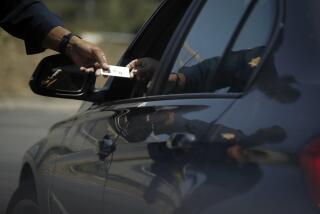Miranda Warnings Not Always Necessary
- Share via
Q. I was stopped for drunk driving one night. The officer had me do several tests such as standing on one foot and touching my nose with one hand. He also asked me several questions about how much I had drunk and what kind of drinks they were.
During the entire time, I was very nervous and frightened. I did everything the officer asked, and I answered all his questions even to admitting that I had drunk three glasses of wine.
I have now been charged with drunk driving, and I’ve been wondering whether my answers about my drinking can be used against me. Nothing like this has ever happened to me, but, from watching TV and the movies, doesn’t he have to give me my rights? The officer never did this.
S.C., Placentia
A. The rights to which you are referring are commonly known as Miranda rights, after the court ruling in case that requires police to give them. Most people are aware of what these rights are because, as you have pointed out, they are frequently given on television and in the movies. Generally, police officers must advise people of the right to an attorney, the right to a free attorney if they cannot afford one and the right to remain silent because anything they say may be used against them in court.
A police officer, however, must normally give these rights only when the person being questioned is under arrest. An officer is not generally required to do so when the questioning is part of a routine investigation. The law provides that questioning of persons suspected of driving under the influence of alcohol is ordinarily part of such an investigation, and does not require the giving of Miranda rights.


